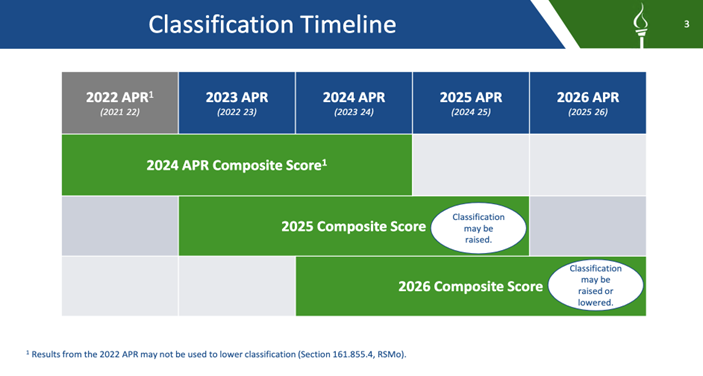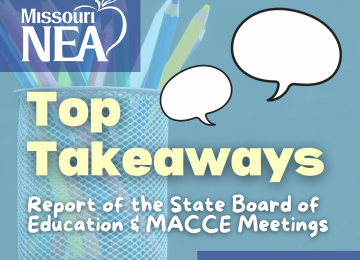Dr. Paul Katnik, Assistant Commissioner in the Office of Educator Quality, delivered his annual Teacher Workforce Report to the State Board during the January meeting. The report included new additions due to federal relief funding for Teacher Recruitment and Retention in Missouri.
The workforce data report showed slight, incremental increases in recruitment and retention efforts–a positive sign for the many recruitment and retention strategies from the last three years. The Community Training and Assistance Center was the external evaluator to determine the effectiveness of the grants that were created as a result of the relief funding. Both quantitative and qualitative data suggest the grants from federal relief funding were effective. The findings from the external evaluators were created into the Missouri Recruitment and Retention Playbook, which is in a class by itself in the country as there are no other states that have such an explicit, systematic focus on teacher recruitment and retention from the state level. The playbook includes eight cornerstones from which a teacher recruitment and retention system will function.

While the efforts of this work are appreciated, Missouri NEA advocates for the department to include more educator voices in the process–which is also cornerstone 7–and further focus on practical research surrounding causes of educator exodus, stress-induced leaves of absences, and lack of participation in and withdrawal from EPPs. This includes a systematic tool to analyze Working Conditions in districts, which Missouri NEA has consistently supported (B-31).
DESE will also be rolling out a new Educator Job Board–like MO REAP–that is free to all schools in the state. It will include weekly featured positions, networking opportunities for teacher candidates, and simplifying the process of finding a teaching job. The Job Board is part of a pilot program that Nimble will run. The Job Board will also include a data dashboard that identifies shortage areas by subject, school type, and region in real-time. This will give decision-makers more timely data regarding the Missouri educator workforce.
Overall, Missouri NEA appreciates DESE’s intentional focus in this area and that Missouri is a leading state in recruitment and retention efforts. Going forward, Missouri NEA looks forward to collaborating with the state and LEAs to bolster all these necessary components regarding educator recruitment and retention.
Dr. Paul Katnik and Dr. Darryl Fridley presented Educator First’s findings on a study of Missouri Teaching Quality. “Education First conducted a comprehensive study of teacher recruitment, preparation, and retention” started in Spring 2024.
The study came away with six recommendations (right) that the department plans to integrate with the cornerstones found in the Missouri Teacher Recruitment and Retention Playbook. DESE’s conclusion of this study “underscores the value of previous and current efforts [and] identifies areas for future initiatives.”
In December 2024, DESE delivered a report on the recent MSIP 6 APR release. The State Board is now classifying school districts after the release; however, the 2024 APR scores released the prior month did not determine the classification. The criteria for classifying school districts for 2024 included “Legal compliance, parent education program, financial condition, Superintendent Certification, resolution of prior MSIP Findings.” The new classification timeline using the composite APR score is to the left.

Significant discussion focused on St. Louis Public Schools' recent leadership changes and financial audits, which have the attention of state stakeholders and decision-makers. Although SLPS was classified as “accredited” in this report, the board asked for further details in the coming months regarding DESE’s work with SLPS since the start of the school year.
“The Association…believes that a high-quality structure of accountability functions best when it is separate from high stakes testing and accreditation. A separate structure of accountability encourages schools to focus on improvement” (A-4)
Perry Gorrell, Chief of Government Relations, discussed the legislative session at an elevated level by listing the high-frequency education topics in the pre-filed bills. In pre-filed bills, 1,354 different pieces of legislation were filed, and 185 were about education.
Education topics filed so far include school safety, assessment, accountability, accreditation, childcare, school choice, charter school expansion, open enrollment, and modifications to past legislation.
At the time of this update, committees had not been assigned yet.
For frequent, reliable, and relevant education legislative updates, sign up for MNEA Legislative Update listserv by MNEA Legislative Director Otto Fajen.
Notice of Emergency Rule Change for Child Care Hearings
The department has brought forth this emergency regulation to adjust the process for hearings now that the Office of Childhood is located within DESE. This will establish a last step for families “who disagree with their eligibility determination.” The emergency rule change was approved.
MNEA believes that every student and educator deserves the best experience possible in schools. That is why we are the only educational organization consistently present at every meeting of DESE, the State Board of Education, and the Missouri Legislature. We are your eyes and ears where decisions are being made about your schools.
The Missouri State Board of Education's next meeting will be held on February 11, 2025, at the Special Olympics in Jefferson City, Missouri. If you have any questions or suggestions, please contact Samantha Hayes at 800-392-0236 or Samantha.Hayes@mnea.org.
The Monthly State Board Report is also available as a Podcast at MNEA Connects. You can listen on Amazon Music, Apple Podcast, Google Podcast, Podbean, or Spotify.



